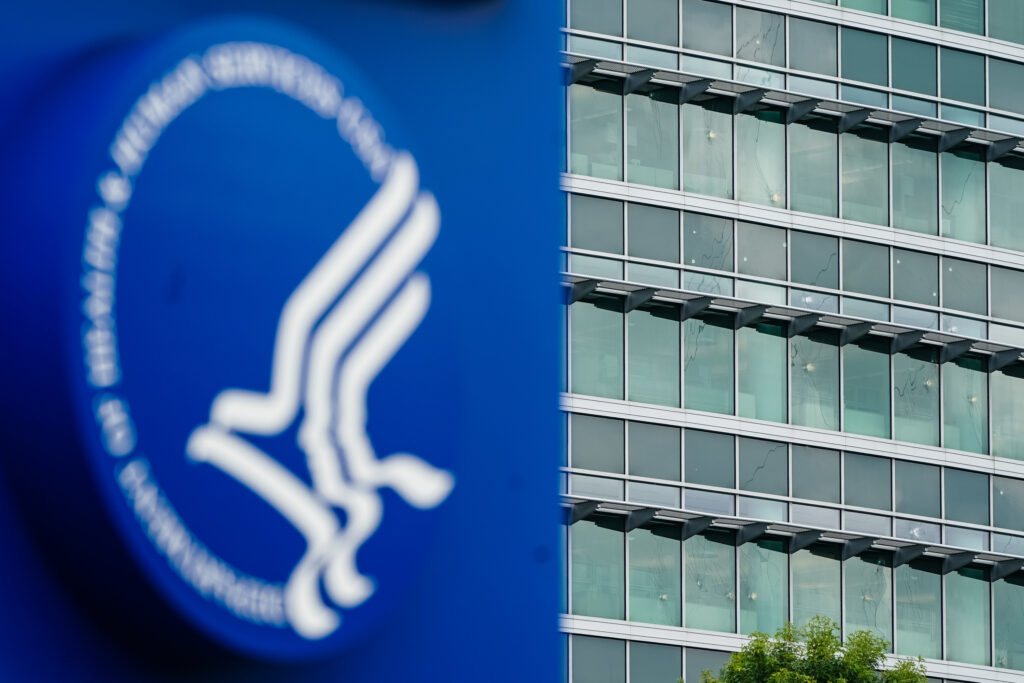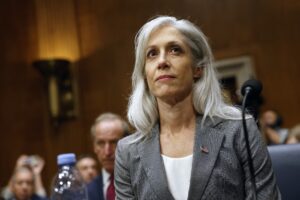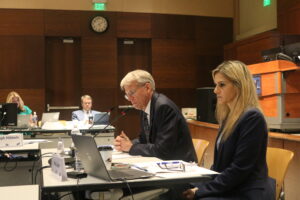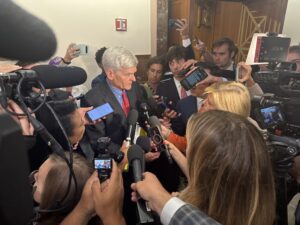
The CDC’s Advisory Committee on Immunization Practices, which meets three times a year, will likely vote to shift eligibility requirements for immunizations at its second meeting of 2025. Elijah Nouvelage/Getty Images
A key advisory panel that oversees nationwide vaccine recommendations will meet this week at the Centers for Disease Control and Prevention in Atlanta amid ongoing uncertainty about which Americans can access a wide slate of vaccines.
The committee, known as the Advisory Committee on Immunization Practices, will likely vote to shift eligibility requirements for immunizations against diseases including measles, hepatitis B and COVID-19.
Established in 1964, ACIP is charged with setting national guidelines around which people should be vaccinated against a plethora of preventable diseases and when those vaccines should be administered. The recommendations also play a key role in determining which vaccines insurance companies are willing to cover and how accessible immunizations are for the public to access.
The committee, which meets three times a year, has not historically garnered much public interest. But earlier this year, U.S. Health Secretary Robert F. Kennedy Jr. abruptly dismissed all 17 existing members of the committee and replaced them with seven hand-picked appointees, many of whom are seen as vaccine skeptics, launching the little-known committee into the national spotlight. Ahead of Thursday’s meeting, Kennedy has appointed an additional five members to the panel, several of whom have publicly advocated against vaccines and immunization mandates.
Controversy over the panel’s recommendations has also contributed to ongoing turmoil at the CDC. Former Director Susan Monarez, who was fired by Kennedy in August after serving as head of the agency for less than a month, claimed she was dismissed for refusing to preapprove ACIP recommendations that did not align with scientific evidence in an op-ed published this month by the Wall Street Journal. Three senior leaders at the CDC also resigned in protest after Monarez was ousted.

Monarez, who testified Wednesday before the Senate Committee on Health, Education, Labor and Pensions, said she worries that the panel will move to restrict access to vaccines, worsening ongoing outbreaks of diseases like measles.
“Based on what I observed during my tenure, there is a real risk that recommendations could be made restricting access to vaccines for children and others in need without rigorous scientific review,” Monarez said. “With no permanent CDC director in place, those recommendations could be adopted.”
ACIP expected to revise vaccine schedules for children, adults
Members of ACIP are expected to vote on three different vaccine protocols during their two-day meeting, according to a draft agenda released last week. The first item on the agenda is the MMRV vaccine, which protects against measles, mumps, rubella, and varicella, more commonly known as chickenpox.
Current ACIP recommendations advise health care providers to administer vaccines for MMR and varicella together. However, due to a slightly increased risk of febrile seizures — or convulsions that are caused by a fever — in young children who receive the MMRV vaccine, doctors may choose to administer the two vaccines separately.
The panel may recommend that the vaccines be administered separately for all children, a move that would not restrict vaccine access but may reduce uptake of one or both of the vaccines, particularly for children who have missed vaccine appointments in the past.

ACIP is also slated to review hepatitis B vaccines, which the CDC currently recommends that all infants and most adults receive. But at the most recent ACIP meeting in June, Chairman Martin Kulldorff — a doctor and former Harvard Medical School professor who is known for his opposition to vaccine mandates — signaled that he would be open to postponing hepatitis B requirements for newborn children.
“Unless the mother is hepatitis B positive, an argument could be made to delay the vaccine for this infection, which is primarily spread by sexual activity and intravenous drug use,” he said.
ACIP is expected to change its recommendations at the upcoming meeting, potentially delaying hepatitis B vaccines until age 4, KFF Health News reported.
U.S. Sen. Bill Cassidy, a doctor and Louisiana Republican who cast the deciding vote to confirm Kennedy as health secretary, explained during Wednesday’s hearing that before the hepatitis B vaccine was approved for infants in 1991, more than 20,000 babies a year were infected with the virus in the United States. More than 90% of the children infected with hepatitis B at birth, he said, developed “chronic lifelong infection.”

Speaking to reporters after the hearing ended Wednesday, Cassidy said Americans should not trust any changes ACIP makes to the childhood vaccine schedule. He added that changing the childhood schedule could mean health insurance companies won’t have to cover the cost of any vaccines no longer included in the recommendations.
“You always have to balance the patient’s pocketbook with their health,” Cassidy said. “Now, if the child gets vaccinated at age four, most likely today, because of our success in preventing hepatitis B the child will be okay. But I can promise you there will be some hepatitis B transmission.”
The panel will also examine COVID-19 vaccine guidelines on the second day of the meeting, a subject that has drawn intense scrutiny amid shifting federal guidance on public health policies.
In August, the U.S. Food and Drug Administration, which is tasked with overseeing vaccine development, approved a new round of COVID-19 vaccines aimed at providing immunity against the JN.1 variant. While previous booster shots had been recommended for everyone six months of age and older, the new recommendations limited eligibility for the updated shots to only those who are 65 or older, as well as younger people with certain health problems. ACIP may vote to follow suit.
Kennedy appoints new members
Days before the committee was set to hold its second meeting of the year, Kennedy announced the appointment of five new members to the panel. The panel now includes a total of 12 members, many of whom have publicly opposed existing vaccine policies and mandates.
Key vaccine panel recommends banning thimerosal from shots but CDC’s own research says it’s harmless
In a press release, the U.S. Department of Health and Human Services said the appointments “reflect the commitment of Secretary Robert F. Kennedy, Jr. to transparency, evidence-based science, and diverse expertise in guiding the nation’s immunization policies.”
Jim O’Neill, the agency’s deputy secretary who is serving as the acting director of the CDC, added that the new appointments would help restore public trust in the agency, which Kennedy has outlined as a priority.
“The new ACIP members bring a wealth of real-world public health experience to the job of making immunization recommendations,” O’Neill said in a statement. “We are grateful for their service in helping restore the public confidence in vaccines that was lost during the Biden era.”
The five new members include Hillary Blackburn, a clinically trained pharmacist and podcast host who is the niece of U.S. Sen. Marsha Blackburn of Tennessee; Dr. Evelyn Griffin, a Louisiana-based OB/GYN who has publicly questioned vaccine requirements and testified about adverse vaccine reactions before members of the Louisiana House of Representatives; Dr. Kirk Milhoan, a Hawaii-based pediatric cardiologist who serves as a senior fellow at the Independent Medical Alliance, formerly known as the Frontline COVID-19 Critical Care Alliance, which advocated for the use of the drug ivermectin and other unproven methods to treat COVID-19; Dr. Raymond Pollak, an Illinois-based family medicine physician and transplant specialist; and Catherine M. Stein, a professor of infectious disease epidemiology at Case Western Reserve University who has been an outspoken critic of COVID-19 policies.
Noel Brewer, a professor of public health at the University of North Carolina and a former member of ACIP who served for a year before being fired by Kennedy in June, says the new committee lacks relevant medical and immunology experience compared to previous versions of the panel.
“There’s key expertise missing in vaccinology, patient care and so on,” he said. “They have much less scientific experience, but also a lot less clinical experience.”
The result, Brewer said, is a panel that lacks the trust of the scientific community, while also endangering access to vaccines for a broad range of Americans.
“The meetings will increasingly become a platform for anti-vaccine rhetoric and misinformation, and then finally, through their bully pulpit, they’re trying to take vaccines away from Americans,” he said. “They’ve already taken vaccines away, and they’ll just keep going. I don’t know how long before not many are left.”
States Newsroom senior reporter Jennifer Shutt contributed to this report.
YOU MAKE OUR WORK POSSIBLE.


![[Aggregator] Downloaded image for imported item #1136378](https://whitecounty.com/wp-content/uploads/2025/09/GettyImages-2228550624-1024x683-1-696x464.jpg)


